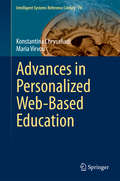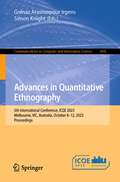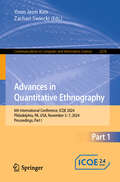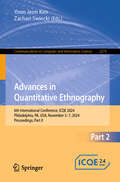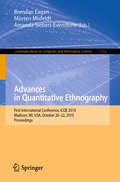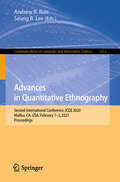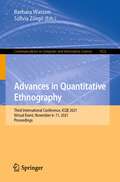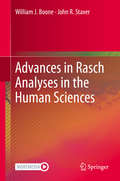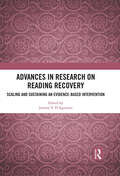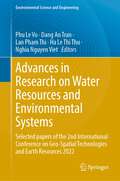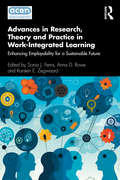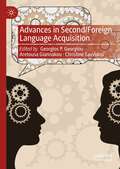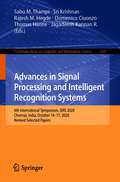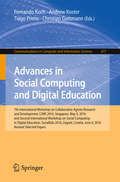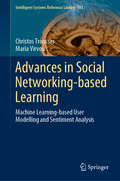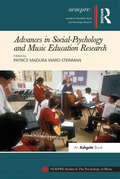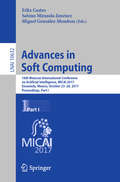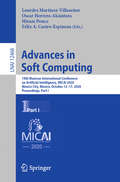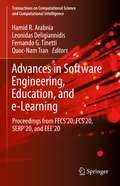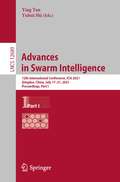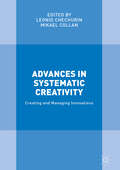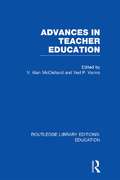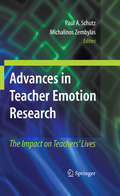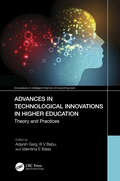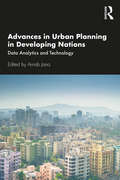- Table View
- List View
Advances in Personalized Web-Based Education (Intelligent Systems Reference Library #78)
by Maria Virvou Konstantina ChrysafiadiThis book aims to provide important information about adaptivity in computer-based and/or web-based educational systems. In order to make the student modeling process clear, a literature review concerning student modeling techniques and approaches during the past decade is presented in a special chapter. A novel student modeling approach including fuzzy logic techniques is presented. Fuzzy logic is used to automatically model the learning or forgetting process of a student. The presented novel student model is responsible for tracking cognitive state transitions of learners with respect to their progress or non-progress. It maximizes the effectiveness of learning and contributes, significantly, to the adaptation of the learning process to the learning pace of each individual learner. Therefore the book provides important information to researchers, educators and software developers of computer-based educational software ranging from e-learning and mobile learning systems to educational games including stand alone educational applications and intelligent tutoring systems.
Advances in Quantitative Ethnography: 5th International Conference, ICQE 2023, Melbourne, VIC, Australia, October 8–12, 2023, Proceedings (Communications in Computer and Information Science #1895)
by Golnaz Arastoopour Irgens Simon KnightThis book constitutes the refereed proceedings of the 5th International Conference on Advances in Quantitative Ethnography, ICQE 2023, held in Melbourne, VIC, Australia, during October 8–12, 2023.The 33 full papers included in this book were carefully reviewed and selected from 39 submissions. They were organized in topical sections as follows: understanding learners and learning; society, culture, identity, and justice; and advances in QE methodologies.
Advances in Quantitative Ethnography: 6th International Conference, ICQE 2024, Philadelphia, PA, USA, November 3-7, 2024, Proceedings, Part I (Communications in Computer and Information Science #2278)
by Yoon Jeon Kim Zachari SwieckiThis two-volume set CCIS 2278-2279 constitutes the refereed proceedings of the 6th International Conference on Advances in Quantitative Ethnography, ICQE 2024, held in Philadelphia, PA, USA, during November 3-7, 2024. The 31 full papers and 10 short papers included in this book were carefully reviewed and selected from 82 submissions. They are organized in the following topical sections: Theory and Methods; Teaching and Learning; and Cultural Discourse.
Advances in Quantitative Ethnography: 6th International Conference, ICQE 2024, Philadelphia, PA, USA, November 3-7, 2024, Proceedings, Part II (Communications in Computer and Information Science #2279)
by Yoon Jeon Kim Zachari SwieckiThis two-volume set CCIS 2278-2279 constitutes the refereed proceedings of the 6th International Conference on Advances in Quantitative Ethnography, ICQE 2024, held in Philadelphia, PA, USA, during November 3-7, 2024. The 31 full papers and 10 short papers included in this book were carefully reviewed and selected from 82 submissions. They are organized in the following topical sections: Theory and Methods; Teaching and Learning; and Cultural Discourse.
Advances in Quantitative Ethnography: First International Conference, ICQE 2019, Madison, WI, USA, October 20–22, 2019, Proceedings (Communications in Computer and Information Science #1112)
by Brendan Eagan Morten Misfeldt Amanda Siebert-EvenstoneThis book constitutes the refereed proceedings of the First International Conference on Quantitative Ethnography, ICQE 2019, held in Madison, Wisconsin, USA, in October 2019. It consists of 23 full and 9 short carefully reviewed papers selected from 52 submissions. The contributions come from a diverse range of fields and perspectives, including learning analytics, history, and systems engineering, all attempting to understand the breadth of human behavior using quantitative ethnographic approaches.
Advances in Quantitative Ethnography: Second International Conference, ICQE 2020, Malibu, CA, USA, February 1-3, 2021, Proceedings (Communications in Computer and Information Science #1312)
by Andrew R. Ruis Seung B. LeeThis book constitutes the refereed proceedings of the Second International Conference on Quantitative Ethnography, ICQE 2020, held in February 2021. Due to the COVID-19 pandemic the conference has been postponed to 2021 and was held in online format. The 28 full papers were selected from 56 submissions. The contributions in this volume come from diverse fields and perspectives, and present the studies on advantages of using quantitative ethnography methods and techniques in a number of different domains and contexts, including ethnography and statistics, human interpretation and machine processing, etc.
Advances in Quantitative Ethnography: Third International Conference, ICQE 2021, Virtual Event, November 6–11, 2021, Proceedings (Communications in Computer and Information Science #1522)
by Barbara Wasson Szilvia ZörgőThis book constitutes the refereed proceedings of the Third International Conference on Quantitative Ethnography, ICQE 2021, held in November 2021. Due to the COVID-19 pandemic the conference was held online. The 26 full papers were selected from the 60 submissions. The contributions in this volume come from diverse fields and perspectives, and present the studies on advantages of using quantitative ethnography methods and techniques in a number of different domains and contexts, including ethnography and statistics, human interpretation and machine processing, etc.
Advances in Rasch Analyses in the Human Sciences
by William J. Boone John R. StaverThis volume follows the publication of Rasch Analysis in the Human Sciences. This new book presents additional topics not discussed in the previous volume. It examines key topics such as partial credit analysis of data, common person linking, computing equating constants, investigating discrimination, evaluating dimensionality, how to better utilize Wright Maps, how to design tests and surveys using Rasch theory, and many more. The book includes activities which can be used to practice the theme of each chapter and to test the reader’s understanding of Rasch techniques. Beginning and ending with a conversation between two students, each chapter provides clear step-by-step instructions as to how to conduct an analysis using the chapter theme. The chapters emphasize applications for the beginner learning Rasch and provide guidance for composing a write-up of an analysis for a presentation, paper, thesis or report.This book explores in detail many important yet often rarely discussed topics in Rasch. With its easy-to-read language and engaging format it reaches a wide audience of scientists, clinicians, students, researchers and psychometricians, providing a valuable toolkit for practical users of Rasch analysis. – Dr. Eva Fenwick, Clinical Research Fellow, Singapore Eye Research Institute (SERI) Assistant Professor, Duke-NUS Medical School, Singapore It is an easy to read book and provides immediate guidance for those wishing to conduct a Rasch analysis. The “conversations” between students in each chapter provides a welcome introduction to each topic. – Prof. Maik Walpuski, University Duisburg-Essen, GermanyThe lessons learned in their first book are extended by providing insightful demonstrations of some of the more complex concepts and techniques used in applying Rasch models. – Dr. Michael R. Peabody, National Association of Boards of Pharmacy, Illinois, USAI am amazed with the ability of these authors to communicate complicated knowledge, and the ability to make this highly complicated knowledge accessible to new learners guiding every step of the way. Through this book we get important knowledge about techniques and the different areas of use for Rasch methods in the human sciences This is truly an important book for students and researchers. – Prof. Charlotte Ringsmose, Aalborg University, Denmark
Advances in Research on Reading Recovery: Scaling and Sustaining an Evidence-Based Intervention
by Jerome V. D’AgostinoThere is no shortage of innovative educational programs – the challenge is learning how to scale and sustain those with strong evidence of effectiveness. This book focuses on Reading Recovery – one of the few educational innovations that has successfully expanded and established itself in several educational systems in the world. Developed by Marie Clay in New Zealand during the mid-1980s, Reading Recovery is an intensive intervention for young students who are struggling to learn how to read, and has expanded to several countries across the globe over the last 30 years. Providing evidence of the intervention’s effectiveness both in the short- and long-term, this volume presents in-depth studies to elucidate why the program is effective; discusses the trials and tribulations in scaling and sustaining the program; and approaches scaling and maintaining from theoretical and practical perspectives. The contributors to this book explain how Reading Recovery has established itself because it has maintained a strong focus on evidence; developed a deep sense of community among its practitioners; and was at the forefront in enhancing professional development of the teachers who delivered the intervention. Understanding the implementation experiences of the intervention is beneficial for any innovation developer who wishes to grow and sustain an intervention. The chapters in this book were originally published as articles in the Journal of Education for Students Placed At Risk.
Advances in Research on Water Resources and Environmental Systems: Selected papers of the 2nd International Conference on Geo-Spatial Technologies and Earth Resources 2022 (Environmental Science and Engineering)
by Phu Le Vo Dang An Tran Thi Lan Pham Ha Le Thi Thu Nghia Nguyen VietThis book composes the proceedings of the international Conference on Geo-Spatial Technologies and Earth Resources (GTER 2022) which was co-organized by Hanoi University of Mining and Geology and the International Society for Mine Surveying (ISM) held at Hanoi city on October 13–14, 2022.GTER 2022 is technically co-sponsored by Vietnam Mining Science and Technology Association (VMST), Vietnam Association of Geodesy, Cartography and Remote Sensing (VGCR), Vietnam National Coal-Mineral Industries Holding Corporation Limited (VINACOMIN), and the Dong Bac Corporation (NECO).GTER 2022 aims to bring together experts, researchers, engineers, and policymakers to discuss and exchange their knowledge and experiences in recent advances research water resources and environmental systems.
Advances in Research, Theory and Practice in Work-Integrated Learning: Enhancing Employability for a Sustainable Future
by Sonia J. Ferns Anna D. Rowe Karsten E. ZegwaardWork-integrated learning (WIL) is a key strategy for enhancing student employability outcomes and lifelong learning capabilities. This timely publication critically reflects on existing scholarship and practice in WIL, discusses contemporary insights, provides a synopsis of resonating themes, and recommends areas for future research and practice. The book aims to position WIL as a strategic imperative for enabling a sustainable workforce through strengthening graduate capacity both in Australia and globally.The collection of edited scholarly chapters were compiled by 59 researchers, practitioners, and experts in WIL, and supported by the peak national professional body for WIL in Australia, the Australian Collaborative Education Network (ACEN). The chapters cover a range of pertinent topics such as teaching and learning, stakeholder engagement, maximizing learning outcomes, diverse forms of WIL practice, support and infrastructure, and future directions. Specific areas of interest include governance and leadership, student equity and wellbeing, quality and evaluation and interdisciplinary WIL. This book is essential reading for researchers, practitioners, workplace and community partners, university leaders, and policy makers, as the practice of WIL continues to expand in the higher education sector.
Advances in Second/Foreign Language Acquisition
by Georgios P. Georgiou Aretousa Giannakou Christine SavvidouThis book includes studies that employ a variety of research techniques from diverse fields targeting a better understanding of the second language (L2)/foreign language (FL) acquisition process including issues of heritage language (HL) learning. Specifically, the chapters discuss matters such as speech perception and production patterns in a second/foreign language, factors that facilitate second language acquisition, acquisition of heritage languages, teaching of a second/foreign language, and acquisition of second/foreign language grammatical and other structures, among others. The investigation of L2/FL and HLs is of paramount importance for updating the existing theories in the field and maximizing learning outcomes for the sake of effective communication, cultivation of intercultural understanding, career advancement, and personal development. The book is of interest to a wide range of disciplinary audiences, including linguists, psychologists, educators, and social scientists.
Advances in Signal Processing and Intelligent Recognition Systems: 6th International Symposium, SIRS 2020, Chennai, India, October 14–17, 2020, Revised Selected Papers (Communications in Computer and Information Science #1365)
by Thomas Hanne Sabu M. Thampi Sri Krishnan Domenico Ciuonzo Rajesh M. Hegde Jagadeesh Kannan R.This book constitutes the refereed proceedings of the 6th International Symposium on Advances in Signal Processing and Intelligent Recognition Systems, SIRS 2020, held in Chennai, India, in October 2020. Due to the COVID-19 pandemic the conference was held online. The 22 revised full papers and 5 revised short papers presented were carefully reviewed and selected from 50 submissions. The papers cover wide research fields including information retrieval, human-computer interaction (HCI), information extraction, speech recognition.
Advances in Social Computing and Digital Education: 7th International Workshop on Collaborative Agents Research and Development, CARE 2016, Singapore, May 9, 2016 and Second International Workshop on Social Computing in Digital Education, SocialEdu 2016, Zagreb, Croatia, June 6, 2016, Revised Selected Papers (Communications in Computer and Information Science #677)
by Fernando Koch Christian Guttmann Andrew Koster Tiago PrimoThis book constitutes the refereed proceedings of the 7th International Workshop on Collaborative Agents Research and Development, CARE 2016, held in Singapore in May 2016 and Second International Workshop on Social Computing in Digital Education, SocialEdu 2016, held in Zagreb, Croatia, in June 2016. For CARE 2016 there were 4 papers selected out of 7 submissions, and for SocialEdu 5 papers were selected from 7 submissions. The 9 extended and revised full papers presented were carefully reviewed. The papers deal with topics like techniques of continuous monitoring, human behaviour analysis, recommendation systems, adjustment of education activities, intelligent content placement, and others.
Advances in Social Networking-based Learning: Machine Learning-based User Modelling and Sentiment Analysis (Intelligent Systems Reference Library #181)
by Maria Virvou Christos TroussasThis book discusses three important, hot research issues: social networking-based learning, machine learning-based user modeling and sentiment analysis. Although these three technologies have been widely used by researchers around the globe by academic disciplines and by R&D departments in the IT industry, they have not yet been used extensively for the purposes of education. The authors present a novel approach that uses adaptive hypermedia in e-learning models to personalize educational content and learning resources based on the needs and preferences of individual learners. According to reports, in 2018 the vast majority of internet users worldwide are active on social networks, and the global average social network penetration rate as of 2018 is close to half the population. Employing social networking technologies in the field of education allows the latest technological advances to be used to create interactive educational environments where students can learn, collaborate with peers and communicate with tutors while benefiting from a social and pedagogical structure similar to a real class. The book first discusses in detail the current trend of social networking-based learning. It then provides a novel framework that moves further away from digital learning technologies while incorporating a wide range of recent advances to provide solutions to future challenges. This approach incorporates machine learning to the student-modeling component, which also uses conceptual frameworks and pedagogical theories in order to further promote individualization and adaptivity in e-learning environments. Moreover, it examines error diagnosis, misconceptions, tailored testing and collaboration between students are examined and proposes new approaches for these modules. Sentiment analysis is also incorporated into the general framework, supporting personalized learning by considering the user’s emotional state, and creating a user-friendly learning environment tailored to students’ needs. Support for students, in the form of motivation, completes the framework. This book helps researchers in the field of knowledge-based software engineering to build more sophisticated personalized educational software, while retaining a high level of adaptivity and user-friendliness within human–computer interactions. Furthermore, it is a valuable resource for educators and software developers designing and implementing intelligent tutoring systems and adaptive educational hypermedia systems.
Advances in Social-Psychology and Music Education Research (SEMPRE Studies in The Psychology of Music)
by Patrice Madura Ward-SteinmanThis Festschrift honors the career of Charles P. Schmidt on the occasion of his retirement from the Indiana University Jacobs School of Music. His main research focus has been the social-psychology of music education, including the subtopics of motivation in music learning, applied music teaching behaviors, and personality and cognitive styles in music teaching and learning. The chapters in this volume recognize the influence of Schmidt as a researcher, a research reviewer, and a research mentor, and contribute to the advancement of the social-psychological model and to research standards in music education. These themes are developed by a stunning cast of music education scholars, including Hal Abeles, Don Coffman, Mary Cohen, Robert Duke, Patricia Flowers, Donna Fox, Victor Fung, Joyce Gromko, Jere Humphreys, Estelle Jorgensen, Anthony Kemp, Barbara Lewis, Clifford Madsen, Lissa May, Peter Miksza, Rudolf Radocy, Joanne Rutkowski, Wendy Sims, Keith Thompson, Kevin Watson, and Stephen Zdzinski. Their writings are presented in three sections: Social-Psychological Advances in Music Education, Social Environments for Music Education, and Advancing Effective Research in Music Education. This collection, edited by Patrice Madura Ward-Steinman, will prove invaluable for students and faculty in search of important research questions and models of research excellence.
Advances in Soft Computing: 16th Mexican International Conference on Artificial Intelligence, MICAI 2017, Enseneda, Mexico, October 23-28, 2017, Proceedings, Part I (Lecture Notes in Computer Science #10632)
by Sabino Miranda-Jiménez Félix Castro Miguel González-MendozaThe two-volume set LNAI 10632 and 10633 constitutes the proceedings of the 16th Mexican International Conference on Artificial Intelligence, MICAI 2017, held in Enseneda, Mexico, in October 2017. The total of 60 papers presented in these two volumes was carefully reviewed and selected from 203 submissions. The contributions were organized in the following topical sections: Part I: neural networks; evolutionary algorithms and optimization; hybrid intelligent systems and fuzzy logic; and machine learning and data mining. Part II: natural language processing and social networks; intelligent tutoring systems and educational applications; and image processing and pattern recognition.
Advances in Soft Computing: 19th Mexican International Conference on Artificial Intelligence, MICAI 2020, Mexico City, Mexico, October 12–17, 2020, Proceedings, Part I (Lecture Notes in Computer Science #12468)
by Oscar Herrera-Alcántara Lourdes Martínez-Villaseñor Hiram Ponce Félix A. Castro-EspinozaThe two-volume set LNAI 12468 and 12469 constitutes the proceedings of the 19th Mexican International Conference on Artificial Intelligence, MICAI 2020, held in Mexico City, Mexico, in October 2020. The total of 77 papers presented in these two volumes was carefully reviewed and selected from 186 submissions. The contributions are organized in topical as follows: Part I: machine and deep learning, evolutionary and metaheuristic algorithms, and soft computing. Part II: natural language processing, image processing and pattern recognition, and intelligent applications and robotics.
Advances in Software Engineering, Education, and e-Learning: Proceedings from FECS'20, FCS'20, SERP'20, and EEE'20 (Transactions on Computational Science and Computational Intelligence)
by Hamid R. Arabnia Quoc-Nam Tran Leonidas Deligiannidis Fernando G. TinettiThis book presents the proceedings of four conferences: The 16th International Conference on Frontiers in Education: Computer Science and Computer Engineering + STEM (FECS'20), The 16th International Conference on Foundations of Computer Science (FCS'20), The 18th International Conference on Software Engineering Research and Practice (SERP'20), and The 19th International Conference on e-Learning, e-Business, Enterprise Information Systems, & e-Government (EEE'20). The conferences took place in Las Vegas, NV, USA, July 27-30, 2020 as part of the larger 2020 World Congress in Computer Science, Computer Engineering, & Applied Computing (CSCE'20), which features 20 major tracks. Authors include academics, researchers, professionals, and students. This book contains an open access chapter entitled, "Advances in Software Engineering, Education, and e-Learning".Presents the proceedings of four conferences as part of the 2020 World Congress in Computer Science, Computer Engineering, & Applied Computing (CSCE'20);Includes the tracks Computer Engineering + STEM, Foundations of Computer Science, Software Engineering Research, and e-Learning, e-Business, Enterprise Information Systems, & e-Government;Features papers from FECS'20, FCS'20, SERP'20, EEE'20, including one open access chapter.
Advances in Swarm Intelligence: 12th International Conference, ICSI 2021, Qingdao, China, July 17–21, 2021, Proceedings, Part I (Lecture Notes in Computer Science #12689)
by Ying Tan Yuhui Shihis two-volume set LNCS 12689-12690 constitutes the refereed proceedings of the 12th International Conference on Advances in Swarm Intelligence, ICSI 2021, held in Qingdao, China, in July 2021. The 104 full papers presented in this volume were carefully reviewed and selected from 177 submissions. They cover topics such as: Swarm Intelligence and Nature-Inspired Computing; Swarm-based Computing Algorithms for Optimization; Particle Swarm Optimization; Ant Colony Optimization; Differential Evolution; Genetic Algorithm and Evolutionary Computation; Fireworks Algorithms; Brain Storm Optimization Algorithm; Bacterial Foraging Optimization Algorithm; DNA Computing Methods; Multi-Objective Optimization; Swarm Robotics and Multi-Agent System; UAV Cooperation and Control; Machine Learning; Data Mining; and Other Applications.
Advances in Systematic Creativity: Creating and Managing Innovations
by Mikael Collan Leonid ChechurinThis book presents a collection of the most current research into systemic creativity and TRIZ, engendering discussion and the exchange of new discoveries in the field. With chapters on idea generation, decision making, creativity support tools, artificial intelligence and literature based discovery, it will include a number of instruments of inventive design automation. Consisting of 15-20 chapters written by leading experts in the theory for inventive problem solving (TRIZ) and adjacent fields focused upon heuristics, the contributions will add to the method of inventive design, dialogue with other tools and methods, and teaching creativity in management education through real-life case studies.
Advances in Teacher Education (Routledge Library Editions: Education)
by Ved P. Varma V. Alan McclellandDuring the 1980s, Britain’s educational system was restructured and redirected. Of the many changes which were made, perhaps the most far-reaching have affected the education of teachers themselves.The contributors to this book have all been centrally involved in the reforming process of teacher education, as providers, assessors, or practitioners, and it is as such that they reflect upon the significant features of the changes in teacher education, while assessing the fulfilment of the initial promise. The book analyses recent advances in teacher education, especially the trend towards improved teacher awareness and explains the application of new ideas in education, considering their political causes and effects. The first critical appraisal of the Thatcherite reform of teacher education, this book also provides an up-to-date examination of the support services for teachers in-service, and shows what is amiss with the government’s strategies for in-service training.With its clear insights into the pressing concerns of teacher education today, Advances in Teacher Education will be an invaluable resource base for students, teachers, lectures, and educational administrators as they attempt to understand the motivation and stresses of teacher reform.
Advances in Teacher Emotion Research: The Impact on Teachers' Lives
by Michalinos Zembylas Paul A. SchutzSome reports estimate that nearly 50% of teachers entering the profession leave within the first five years (Alliance for Excellent Education 2004; Ingersoll, 2003; Quality Counts 2000). One explanation of why teachers leave the profession so early in their career might be related to the emotional nature of the teaching profession. For example, teaching is an occupation that involves considerable emotional labor. Emotional labor involves the effort, planning, and control teachers need to express organizationally desired emotions during interpersonal transactions. As such, emotional labor has been associated with job dissatisfaction, health symptoms and emotional exhaustion, which are key components of burnout and related to teachers who drop out of the profession. Research into emotional labor in teaching and other aspects of teachers' emotions is becoming increasingly important not only because of the growing number of teachers leaving the profession, but also because unpleasant classroom emotions have considerable implications for student learning, school climate and the quality of education in general. Using a variety of different methodological and theoretical approaches, the authors in this edited volume, Advances in Teacher Emotion Research: The Impact on Teachers' Lives, provide a systematic overview that enriches our understanding of the role of emotions in teachers' professional lives and work. More specifically, the authors discuss inquiry related to teachers' emotions in educational reform, teacher identity, student involvement, race/class/gender issues, school administration and inspection, emotional labor, teacher burnout and several other related issues. This volume, then, represents the accumulation of different epistemological and theoretical positions related to inquiry on teachers' emotions, acknowledging that emotions are core components of teachers' lives. Advances in Teacher Emotion Research takes an eclectic look at teacher emotions, presenting current research from diverse perspectives, thereby making this volume a significant contribution to the field.
Advances in Technological Innovations in Higher Education: Theory and Practices (Innovations in Intelligent Internet of Everything (IoE))
by Adarsh Garg Valentina E Balas B V BabuThe evolution of technology in education can no longer be comprehended simply by looking at the use of computers and networks. Technology is not just a supplementary tool to the conventional method of education. Education has to undergo a complete transformation with technological innovations for the sustainability of quality education as a system and not in silos. Sustainability in education also necessitates a more workable strategy to realize socially viable educational policies and practices which can focus more on personalized learning. Due to various factors like emerging technologies; changing needs of the learners; policy reforms for enhancing employability; and emphasis on uninterrupted education as in the case of the pandemic scenario of COVID-19, there is a need to steer a major transition in the education system. The education system has to be real and proficient for it to be instrumental to nurture an informed and knowledgeable society. This book on technological innovations in higher education is organized, largely, based on the diversity of higher education ecosystems that are supported by technological innovations. Various author viewpoints give insights into the full potential of technology as well as its risks in interrelated areas of higher education to work towards sustainability of value-based quality education across the globe.
Advances in Urban Planning in Developing Nations: Data Analytics and Technology
by Arnab JanaThis book studies the increasing use of data analytics and technology in urban planning and development in developing nations. It examines the application of urban science and engineering in different sectors of urban planning and looks at the challenges involved in planning 21st-century cities, especially in India. The volume analyzes various key themes such as auditory/visual sensing, network analysis and spatial planning, and decision-making and management in the planning process. It also studies the application of big data, geographic information systems, and information and communications technology in urban planning. Finally, it provides data-driven approaches toward holistic and optimal urban solutions for challenges in transportation planning, housing, and conservation of vulnerable urban zones like coastal areas and open spaces. Well supplemented with rigorous case studies, the book will be of interest to scholars and researchers of architecture, architectural and urban planning, and urban analytics. It will also be useful for professionals involved in smart city planning, planning authorities, urban scientists, and municipal and local bodies.
